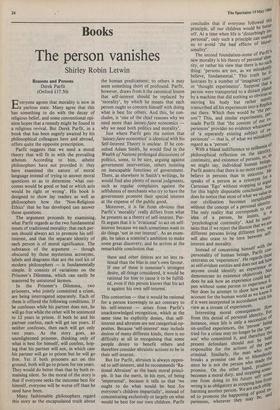Books
The person vanishes
Shirley Robin Letwin
Reasons and Persons Derek Parfit (Oxford £17.50) Everyone agrees that morality is now in 1..ra parlous state. Many agree that this has something to do with the decay of religious belief, and some conventional opi- nion hopes that a remedy might be found in a religious revival. But Derek Parfit, in a book that has been eagerly awaited by his philosophical colleagues here and abroad, offers quite the opposite prescription. Parfit suggests that we need a moral theory that will fit in with the prevailing atheism. According to him, atheist philosophers have not provided it: they have examined the nature of moral language instead of trying to answer moral questions so as to determine 'what out- comes would be good or bad or which acts would be right or wrong'. His book is designed to show lay readers as well as philosophers how the 'Non-Religious Ethics' that he has developed can answer those questions. The argument proceeds by examining, what Parfit regards as the two fundamental tenets of traditional morality: that each per- son should always act to promote his self- interest, and that the separate identity of each person is of moral significance. The substance of the argument — though obscured by those mysterious acronyms, labels and diagrams that are the tool kit of modern philosophers — is fundamentally simple. It consists of variations on the Prisoner's Dilemma, which can easily be mastered by untutored laymen. In the Prisoner's Dilemma, two prisoners, who jointly committed a crime, are being interrogated separately. Each of them is offered the following conditions. If he confesses while his partner does not, he will go free while the other will be sentenced to 12 years in prison. If both he and his partner confess, each will get ten years. If neither confesses, then each will get only two years. As the story goes, an unenlightened prisoner, thinking only of what is best for himself, will confess, hop- ing that his partner will not, in which case his partner will go to prison but he will go free. Yet if both prisoners act on this ground, both will go to prison for ten years. They would do better than that by both re- maining silent. So the moral of the story is that if everyone seeks the outcome best for himself, everyone will be worse off than he need have been. Many fashionable philosophers regard this story as the encapsulated truth about the human predicament; to others it may seem something short of profound. Parfit, however, draws from it the canonical lesson that self-interest should be replaced by `morality', by which he means that each ought ught to concern himself with doing es, is ' what is best for others. And this, he con- cludes, of the chief reasons why we need more than laissez-faire economics — why we need both politics and morality'. Just where Parfit gets the notion that `laissez-faire economics' is identical with his Self-Interest Theory is unclear. If he con- sulted Adam Smith, he would find in the Wealth of Nations prolonged discussions of politics, some, to be sure, arguing against intervention, others government intehers insisting es on inescapable functions of government. There, as elsewhere in Smith's writings, he would find also plenty of moral judgments, such as regular complaints against the selfishness of merchants who try to have the government promote their special interest at the expense of the public good. Moreover, it is far from obvious that Parfit's 'morality' really differs from what want to he presents as a theory of self-interest. Par- fit argues that it is 'irrational' to act on self- interest because we each sometimes do things 'not in our interest'. As an exam- ple, he takes a scientist's ambition to make some great discovery; and he arrives at the remarkable conclusion that theseand other desires are no less ra- tional than the bias in one's own favour. If one of these is someone's strongest desire, all things considered, it would be person knows that his act rational for him to cause it to be fulfill- ed, even if this is against his own self-interest. This contortion — that it would be rational for a person knowingly to act contrary to his self-interest — arises from Parfit's unacknowledged recognition, which at the same time he explicitly denies, that self- interest and altruism are not categorical op- posites. Because 'self-interest' may include desires of many different kinds, there is no difficulty at all in recognising that some people desire to benefit others and therefore consider altruistic actions to be in their self-interest. But for Parfit, altruism is always oppos- ed to self-interest, and he recommends 'Ra- tional Altruism' as the basic moral princi- ple. It has the merit, in his eyes, of being 'impersonal', because it tells us that 'we ought to do what would be best for everyone's children impartially', instead of concentrating exclusively or largely on what would be best for our own children. Parfit concludes that if The everyone rSpectatoryon e f o 11190 wMeady t9h8i4s principle, all our children would be better `disturbinglY personal', such ainciplea off. At a time when life is rsnal', only ch principle can enable to avoid 'the bad effects of imper- sonality'. The second foundation-stone of Parties new morality is his theory of personal idol' tity, or rather his view that there is no such thing: 'persons are not, as we mistakenlY believe, fundamental.' This truth he it lustrates by a number of 'imaginary eases' or 'thought experiments'. Suppose that a person were transported to a distant planet mbyoavimngachhinise thbaotddyid nboutthinrgatshoeorbvinioeurseash, transcribed all his experiences into a Replica out there. Which then would be 'the per- son'? This, and similar experiments, Per- suade Parfit that 'the content of our ex- periences' provides no evidence whatsoever of 'a separately existing subject of ex" rpeegraierndcaess'a7ptehrasot of what we mistakenlY With a bland indifference to Mi • of Henraa - philosophical reflection on the identitY' continuity, and existence of persons, or, as we might say, individual human heirig:0' Parfit asserts that there is no more reas°r1,;„ believe in persons than in unicorns. He speaks of a person as a synonym for c Cartesian 'Ego' without stopping to argil r for this highly disputable conclusion. 1°,0 does he notice that most of what we valueklie our civilisation becomes inexplicav without the concept of a personal Went-41JY; The only reality that corresponds to ° a idea of a person, he insists, is .11, 'psychological continuity'. And he °1;e tains that if we reject the illusion that we are different persons living different will i teasItsoancdearnseoratolityb.e torn between sea personality I n s tead o fo fconcerning himself Part ithcot hsa: centrateson 'experiences'.Heregards theow as self-evident entities and does not ask h anyone could identify an experience_oo'r demonstrate its existence objectivelY. does he ask how an experience could• ha!: Npeonr without some pptertsoonshtoowexhpoewriewnecewcanitit account for the human world as we know it viewi f i twere i snttreerapmretoefd eixnpaecriceonr cdeasn.ce with m' flow Interesting moral consequences from this denial of personal identity. "r1 instance, since life is only a sucscoenssiobneiepo__; tried eerximpeermienacyens,0 tihoen;prer son' who committed it, and thbeeretereptiie present defendant should not be h responsible for the actions of the Pt, criminal. Similarly, the man wh°eiens7y breaks a promise can do so blamA the since he is not the person who ma•-•„eence promise. On the other hand, Pru°,0.16... becomes a moral duty, and stopPing wronoengfriosmas odboliniggatotoryhaiss stfouptuprinegtnf some one oh harming another person. We are ed to promote the happening of gboeffiaeL periences, wherever they may
'therefore what others would decry as
paternalism', Parfit finds to be a moral duty.
Besides, Parfit's denial of personal iden- tity enables him to solve definitively the Problem of abortion. In his view, a two- month embryo may be aborted but a seven- month one may not be because the younger one has only a potentiality for becoming human whereas the older one has acquired some human actuality. The suggestion that the Potentiality for being human may be ac- tualised in different degrees is hardly as new Parfit supposes. Moreover, it necessarily Presupposes a personal identity, for other- wise it would be impossible to recognise that a seven-month embryo and the two- month embryo are the same being enjoying the same right to live. Parfit does not carry his convictions so far as to publish his book anonymously. He Deli-nits himself to claim that his views are some ways 'more personal' than those of traditional morality. He also admits that ac- '`_,e.Pting his discovery was 'psychologically difficult'. But he triumphed by recognising that 'if some truth is disturbing, there is no found not to believe this truth'. And he found consolation in the 'liberating' effect of•smi
dismissing personal identity — he no longer feels cut off from others by 'a glass wall' and can 'live in the open air'. Even death has become more acceptable because he can now say, 'There will be no future ex- periences that will be related in certain ways to these present experiences.' It has to be admitted that Parfit's strength of mind is certainly admirable.
But he underestimates the originality of his enterprise. Its being a 'secular' ethics is much less striking than that it dispenses with human personality. This does not mean that Parfit's atheism is irrelevant. The Judaeo-Christian religions which have shaped Western civilisation have all taught regard for human personality, and this understanding has been the foundation of our traditional morality. This is not true, however, of the doctrines that are now replacing religion. They reduce individuals to mere manifestations of non-human forces or structures, or to illusions or `streams' as Buddha taught: 'There exists no Individual. It is only a conventional name given to a set of elements.'
Parfit has taken his cue from such doc- trines and produced a profound attack on Western civilisation. If this is the new wave in moral philosophy, strong breakwaters are in order.















































 Previous page
Previous page